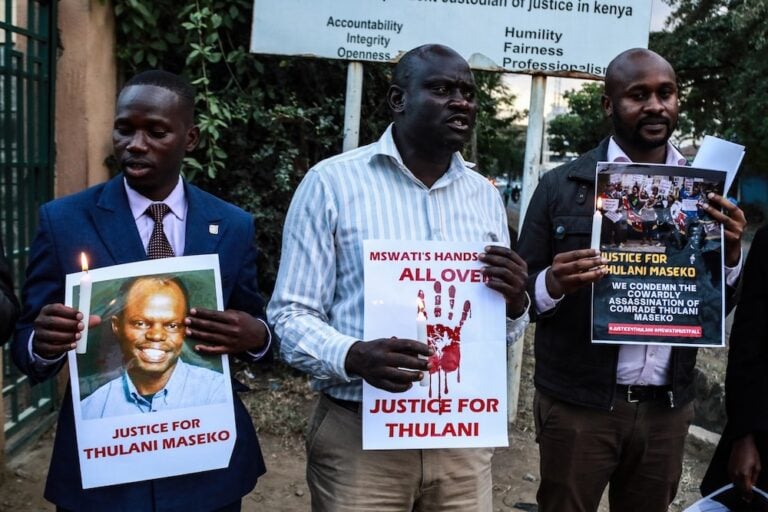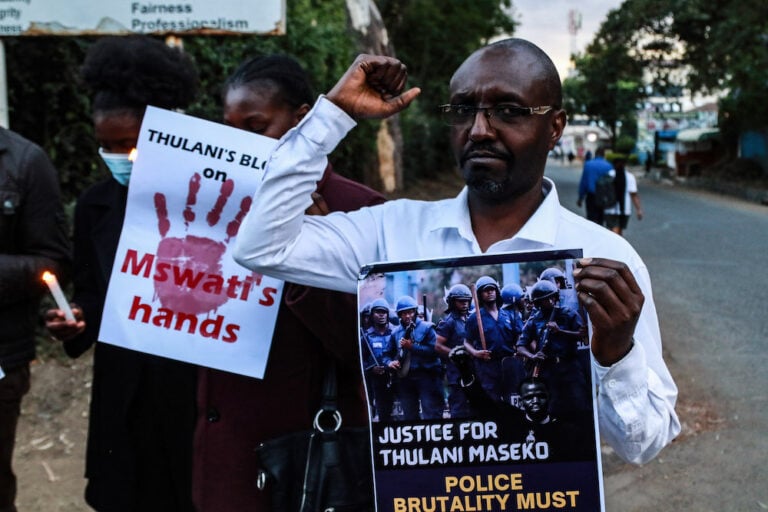One of Swaziland's few independent source of news, The Nation magazine, has been found guilty of “contempt by scandalizing the court” following its publication of two articles in 2009 and 2010 that criticised Chief Justice Michael Ramodibedi.
One of Swaziland’s few independent source of news, The Nation magazine, has been found guilty of “contempt by scandalizing the court” following its publication of two articles in 2009 and 2010 that criticised Chief Justice Michael Ramodibedi.
Editor of the monthly magazine, Bheki Makhubu, and its publisher, Swaziland Independent Publishers, were on Wednesday (17 April 2013) ordered to pay E200,000 (approximately US$20,000) in fines within three days. If payment is not made, and an appeal by the magazine is dismissed, Makhubu will be sentenced to two years in jail.
According to a High Court of Swaziland judgment sheet dated 17 April 2013, under the title Criminal case no: 53/2010, Judge Bheki Maphalala said that “failing payment of the fine of E200,000 (Two hundred thousand Emalangeni) within three days of this Order, in respect of both respondents, the second respondent [Bheki Makhubu] will be committed to prison forthwith for a period of two years”.
The two Nation articles in question – published in November 2009 and in December 2010 – praised Judge Thomas Masuku for his dissenting opinion against two other supreme courts judges in cases dealing with evictions on land held by King Mswati III.
Vuyisile Hlatshwayo, a veteran journalist and current national director of the Swaziland chapter of the Media Institute of Southern Africa (MISA-Swaziland), called the judgment “deeply disappointing” and an “assault to media freedom and free speech”.
Hlatshwayo, who is also a director and founding member of The Nation magazine (and therefore himself liable, along with Makhubu, to pay the US$20,000 fine) said:
“The Nation is the only publication in Swaziland that speaks truth to power and is the voice of the voiceless in a country that is fast becoming a police state. The fine imposed by the judge is also a total clampdown on media freedom – it sends a strong and disturbing signal to the already censored newspapers and broadcast media.”
Secretary-General of the Swaziland Editors’ Forum, Jabu Matsebula, said he was “shocked” at the ruling against The Nation, adding that it is one of the heaviest fines ever handed down in the kingdom.
“It will certainly have a chilling effect on the press and on citizens constitutional rights to freedom of expression,” Matsebula said.
Speaking to MISA-Swaziland, Makhubu – who is also a law student at the University of South Africa – said “today is a sad day for Constitutionalism in Swaziland”. He said he was still “taking it all in” and admitted to feeling “a bit numb”.
However, despite the ruling of criminal contempt against him and the very likely prospect of going to jail for two years, and despite speaking through obvious shock, he said he is “still a great believer in the Swazi constitution”.
The summary of Justice Maphalala’s ruling mentions the “right to freedom of expression and opinion” and says “judges and courts are open to criticism provided that the criticism is fair and legitimate and does not exceed accepted boundaries”. In this case, however, the judge told The Nation it was “guilty of contempt by scandalizing the Court”.
The Nation has since instructed its lawyer to lodge a speedy appeal in the Supreme Court.
MISA continues to follow this development in Swaziland and will be issuing updates.


